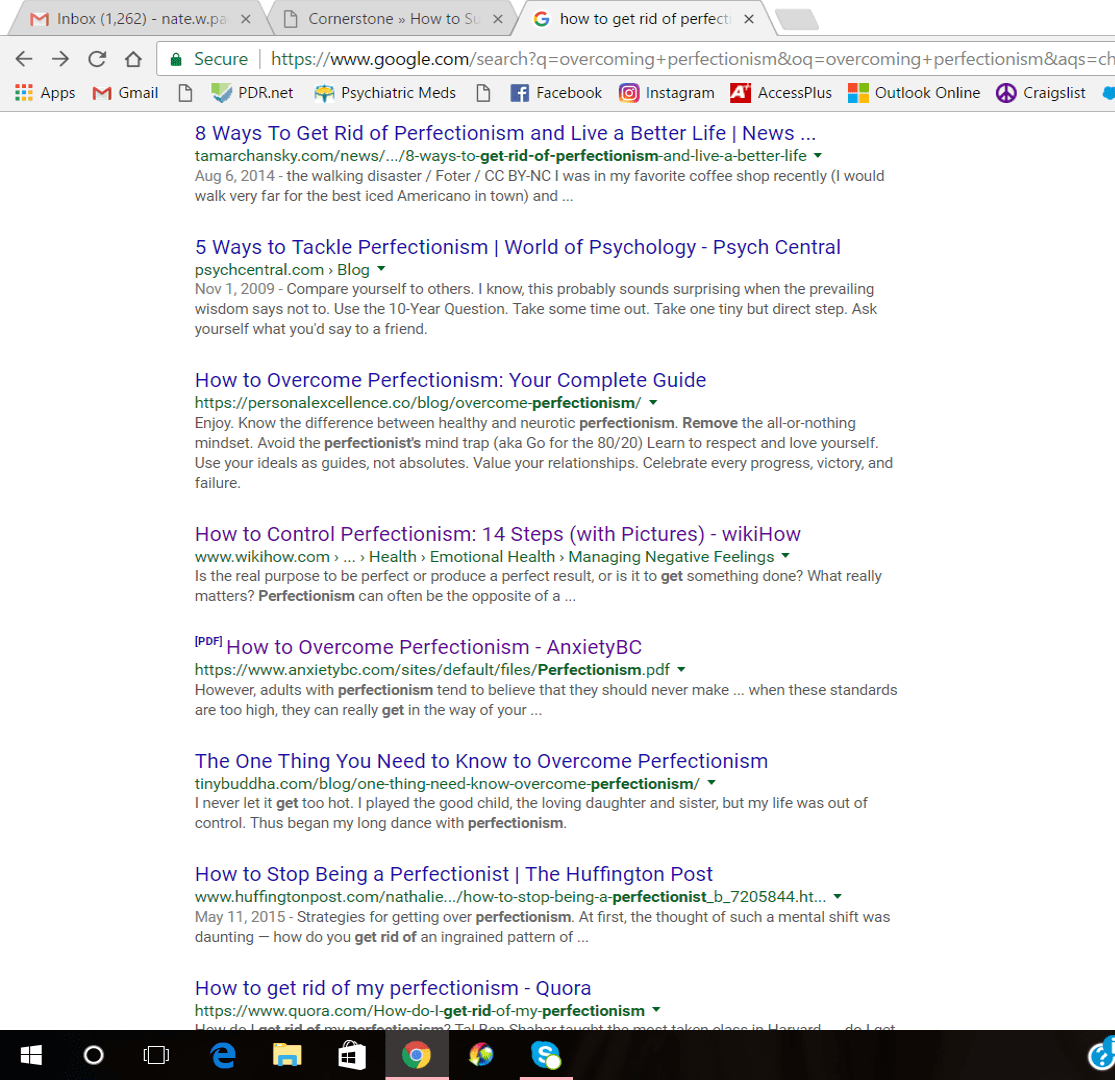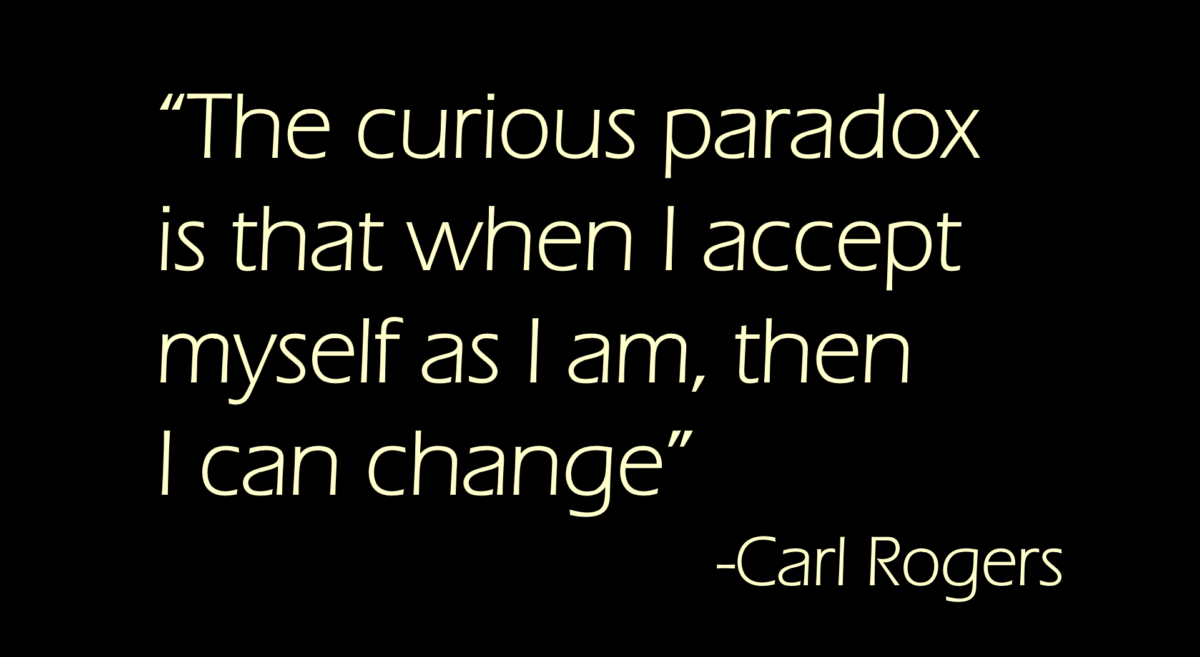Wait, what? That doesn’t quite make sense. I want to overcome perfectionism, not fail at overcoming it. Right?
If you’re reading this blog post, you’re probably wanting to change your perfectionistic mindsets and behaviors, but likely haven’t been able to on your own. You’re stuck, so to speak. If so, don’t worry. This post can help you get unstuck and reconnect with the joy of being a beautifully imperfect human being.
The notion of “overcoming perfectionism” is everywhere. Just look at the screen shot (below) I took a few minutes ago when I searched for “overcoming perfectionism”. Google produced tens of thousands of results with phrases like how to ‘control’, ‘tackle’ and ‘get rid of’ perfectionism.

I work with a lot of clients that are high achieving and are usually able to overcome difficulties in their lives. They work hard at school or in their jobs, and invest significant time and energy in other areas of their lives (family, athletics, volunteerism, etc.). Many have learned to base their worth on their accomplishments and productivity (grades, awards, recognition by professors and bosses, etc). Their perfectionistic mentalities and behaviors have been rewarded by parents, teachers, coaches, and our society at large. Even though they recognize the havoc this perfectionistic mindset can wreak on relationships, creatively, productivity, and overall mental and emotional wellbeing, many of these clients find it (understandably) difficult to relinquish their beloved perfectionistic tendencies.
It is because perfectionists are already so entrenched in a pattern of working to overcome flaws, mistakes, and other imperfections that attempting to overcome perfectionism in this same way (getting rid of a flaw) actually entrenches us further into a perfectionistic mindset. There is something unacceptable about me (my perfectionism) and therefore I need to get rid of it.
Instead, we simply need to accept ourselves as we are in order to let go of perfectionism. This includes accepting our perfectionism. Don’t yet believe me? Allow me some additional explanation.
Perfectionism is a fantasy, imperfection is a reality. I am imperfect. Very much so. Everyone that I know is imperfect. No one ever reaches perfection in their lifetime (and attempting to do so is pursuing a fantasy). Sure, people grow and improve and do incredible things, but not without a significant amount of failures, struggles, and flaws. Oftentimes, those that appear perfect from the outside are the ones that are struggling the most on the inside. The most common internal struggle among perfectionists is a sense of low self worth. The feeling and belief that I am not acceptable, lovable, and good enough as I currently am. This struggle with low self worth is, therefore, why people work so hard to appear perfect on the outside. That way maybe I can find acceptance and love, and can convince others (and myself) that I am good enough.
Growing up, I was a text-book example of a socially-prescribed perfectionist. I deeply feared anyone seeing any of my vulnerabilities and worked hard to only show my successes (good grades, athletics accomplishments, unfailing public happy face). Consequently, no one really ever got to know me because I had to keep so much of myself hidden. I imagine many family members, friends, and acquaintances thought I “had it all together”, but little did they know I struggled with anxiety, depression, and knowing how to really connect with others.
So when a client tells me that other people seem to “have it all together”, I will turn things around and ask how people perceive them. Usually the client will smile and acknowledge that others likely perceive them as having things under control and being happy. One of the benefits to my line of work as a therapist is that I get to see “behind the curtain” of people’s lives and help them connect with the reality that that they already are good enough. Group therapy is such a powerful treatment option because members continually engage in this process together (i.e. test out revealing the ‘messiness’ behind their curtains and experiencing increased connection, acceptance, and understanding that they already are good enough).
The way I define perfectionism is the inability/unwillingness to accept imperfections. It is a difficulty embracing vulnerabilities, mistakes, failures, or other perceived flaws. The antidote for perfectionism, therefore, is cultivating the ability to accept imperfections, vulnerabilities, weaknesses, and perceived flaws.
While the content of a perfectionistic approach can differ among perfectionists (academics, work performance, relationships, art, etc.), the process of working hard to avoid imperfections, vulnerabilities, and perceived flaws is the same. I see time and time again people getting pulled back into this perfectionistic process when they assert “I need to overcome my perfectionism” which is very similar to saying, “I am unable/unwilling to accept the fact that I am a perfectionist”. As clients catch on and recognize this pattern, we usually have a good laugh and I make sure to point out the very significant accomplishment the client just made–a genuine acceptance of the fact that they were being perfectionistic. For a moment, instead of being stuck in a pattern of trying to avoid a vulnerability (i.e. being a perfectionist), they just experienced embracing one of their vulnerabilities (i.e. being a perfectionist). Clients will usually note how freeing and exciting it feels to practice accepting these imperfections. These moment are truly “successful failures in overcoming perfectionism”. It is a success because the failure to overcome perfectionism is, paradoxically, exactly what is needed in order to actually let go of perfectionism.
Carl Rogers (one of the founders of psychological research and the humanistic approach to psychotherapy) said, “the curious paradox is that when I accept myself just as I am, then I can change”.
We usually need to continue practicing “successful failures” (that is, accepting ourselves as we are) in order to get the hang of accepting ourselves with our imperfections. Luckily, we all have a wealth of imperfections to practice with, and perfectionistic mindsets and behaviors are great ones to focus on first. Individual and group therapy are wonderful safe places to practice sharing and accepting our vulnerabilities and ourselves.
One final note is that many people that identify as perfectionists fear that accepting themselves with their imperfections will make it harder to succeed (in school, work, social settings, creative endevours, etc.). I have heard countless people state something like, “If I embrace my imperfections, won’t I lose my motivation to excel?” While I can see the logic behind this hesitation, the truth is it will not hinder your ability to excel. In fact you find much more motivation and positive energy to work hard, continually challenge yourself, and excel in various domains. Your school work, job performance, artistic endevours, and relationships will be much better the more you are able to step out of a the fallacy of a perfectionistic mindset and into a mindset that allows for the reality of vulnerability, imperfections, and humanity. Carol Dweck is a researcher that studies things like perfectionism and mindsets. Here is the link to a TED talk where she does a good job showing the difference between a “fixed mindset” and a “growth mindset”.
I hope that the notion of successfully failing at overcoming perfectionism makes sense at this point. It is a simple concept and clients tend to intuitively get it after experiencing it in session. Yet, because of its paradoxical nature it can be difficult to articulate with words. By all means, please let me know in the comments section below of any edits/suggestions you have for improving this explanation!

